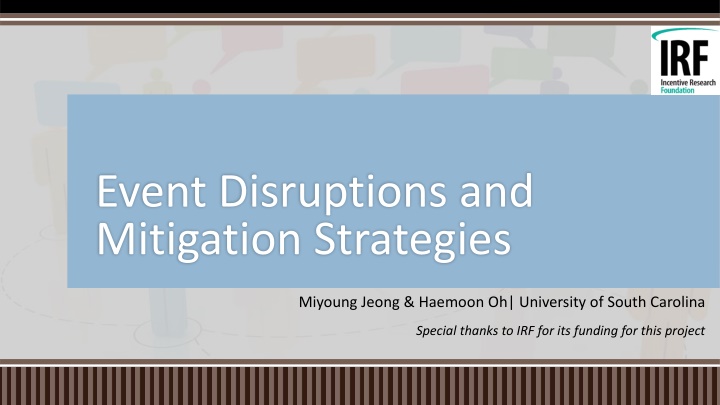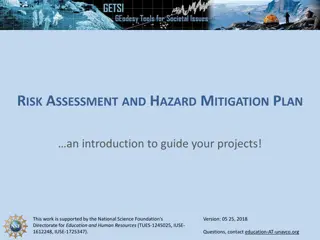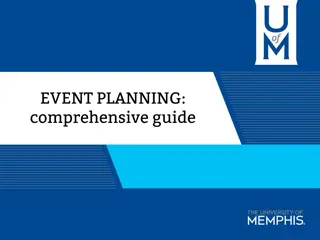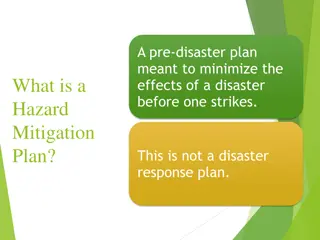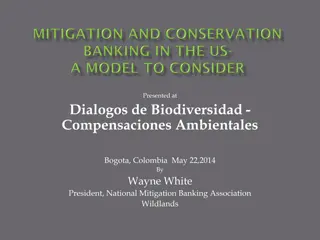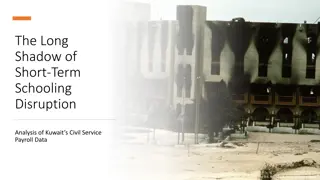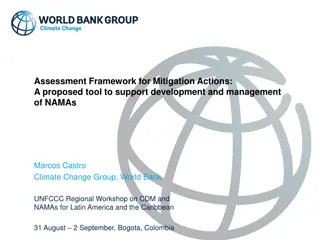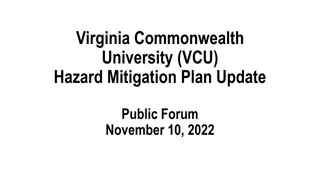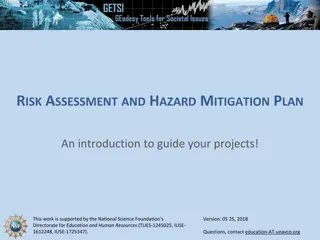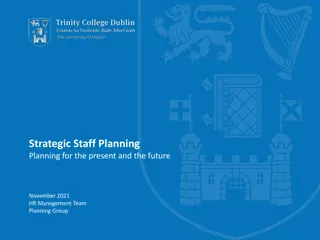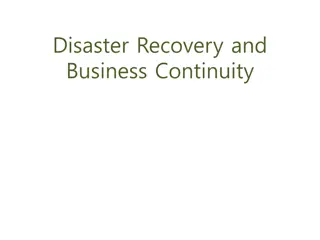Event Disruptions and Mitigation Strategies: A Study on Meeting Planning Business
This study explores the impact of event disruptions on the meeting planning business, highlighting the types, causes, and mitigation strategies for disruptions. The research reveals the necessity of strong relationships and cooperation with partners to navigate disruptions successfully.
Download Presentation

Please find below an Image/Link to download the presentation.
The content on the website is provided AS IS for your information and personal use only. It may not be sold, licensed, or shared on other websites without obtaining consent from the author.If you encounter any issues during the download, it is possible that the publisher has removed the file from their server.
You are allowed to download the files provided on this website for personal or commercial use, subject to the condition that they are used lawfully. All files are the property of their respective owners.
The content on the website is provided AS IS for your information and personal use only. It may not be sold, licensed, or shared on other websites without obtaining consent from the author.
E N D
Presentation Transcript
Event Disruptions and Mitigation Strategies Miyoung Jeong & Haemoon Oh| University of South Carolina Special thanks to IRF for its funding for this project
Abstract This study reports broadly on the state-of-the-art of event disruptions, from the meeting planner s point of view, and their impact on the meeting planning business. Disruptive incidents do occur and they are happening in an increasing frequency these days. They include many weather-related phenomena, public enemy such as wars and terrorism, the business partner s mistakes, and the client s lack of cooperation. Eighteen planners participated in a preliminary personal interview study, and 266 planners participated in a nationwide survey in 2016. Results of this study indicate that 59% of meeting planners reported that they had experienced at least one disruption that affected the overall outcome or success of their event in the past 12 months. The meeting planners listed strong relationships and cooperation with partners and vendors as the most needed resource and their event-specific cooperative and creative offerings are more critical determinant of partnership trust than the resources the partner has.
Background Today, the travel and hospitality industry is experiencing various disruptive challenges. Most disruptions are unpredictable and thus uncontrollable, often broadly impacting the planning and operation of group incentive travel and offsite corporate meetings. Such disruptions include weather delays, natural disasters, technology outages and hacking, medical outbreaks, and terrorism, to name just a few. Disruptions can negatively affect the company s brand or image as well as the event business model when a disaster or situation is captured unfavorably on social media or by the news media. Both the frequency and severity of disruptions have escalated to a point of forced cancellation of the entire event. Already in 2011, about 43% of planners surveyed for the State of the Industry experienced cancellations as a result of unpredicted disruptive issues (Ibrahim, 2011). While disruptive situations have always been a factor for incentive event and meeting planners, their occurrence, and more seriously their growing magnitude of impact on the company s brand in more recent years, is of critical concern due to today s unstable geopolitical environment, 24/7 news cycle, social media, and volatile brand and societal image environment. The increasingly disruptive event environment creates intensifying risks, which need to be mitigated and/or require appropriate industry-wide strategies and efforts to deal with for successful meeting and event businesses.
This study investigates: a. Type of disruptions encountered or anticipated by planners; b. Frequency of disruptions experienced; c. Causes, sources, or origins of disruptions; d. Impact of disruptions on; 1) the success of a planned event and 2) the company s image and brand reputation beyond the event e. Strategies or actions used by planners to mitigate/manage disruptive situations f. Evaluations of partner readiness for and performance in disruption handling; and g. Implications for future industry actions
Subjects & Methods Personal Interview: 25 meeting planners from a national directory of meeting planners National Survey: An electronic survey with meeting planners nationwide and contacted meeting planners via email by using the directories available through IRF, our professional network, and a meeting planner panel retained by a third party organization. Targeted meeting planners who: (1) had at least some influence on decisions related to meetings and events at their organization; (2) would complete planning and executing one meeting or event in the 2015-16 period; (3) would conduct an event that involved at least 10 room nights; and (4) experienced any disruption that affected the overall outcome or success of their events in the past 12 months. Data collection: About a four-month period in the mid-2016.
Results Sample characteristics Personal Interviews Sample characteristics of 18 meeting planners: 11 of whom were female, with the majority (83.4%) aged 41-60, 95% having worked in event planning for at least five years, and 67% planning at least 10 events per year. National Survey: Sample characteristics of 266 meeting planners: 46% female and 58% with a college degree, followed by 23% holding a postgraduate degree and the rest holding either an associate degree (13%) or high school diploma (5.7%). Age: 18% in their 20s, 30% in 30s, 22% in 40s, 21% in 50s, and 9% in 60s or elder. Position: owner, president, vice president, sales manager, IT director, purchasing manager, director of events, etc.
Results 59% of meeting planners reported that they had experienced at least one disruption that affected the overall outcome or success of their event in the past 12 months. Disruptions arising from weather-related events (38%) and vendor failures (28%) are the two most frequently occurring types. Meeting planners also discussed these two categories of disruptions most frequently. For the most recent disruption, contract hotels were responsible for handling it (47%). In general, of the business partners, airlines present the most frequent cause of disruptions through cancellations, delays, and overbooking (61%). Of the event business partners, hotels were most helpful in handling disruptions once they occurred, perhaps because more disruptions occurred within the responsibility of hotels. Of the business partners, hotels were best prepared to handle crises or disruptions, followed by DMCs, and airlines. Nonetheless, there was room to improve significantly in the partners preparedness overall. About 23% of all 2015-2016 events were impacted (negatively), by and large, by a disruption.
Results - continued 43% of meeting planners or their companies have experienced one or more disruptions causing a financial loss. The amount of the most frequent financial loss was between $10,000 and $99,999. 19% of the meeting planners that experienced one or more disruptions in the past 12 months (23%) reported that those disruptions damaged the company s reputation or brand. 41% of the planners have experienced some increase in the time and effort to plan for disruptions in the past two years. 39% of the planners expect that their time and effort to plan for disruptions will increase somewhat in the next two years. 54% of the planners require inclusion of contingency plans in all contracts they enter. 68% of meeting companies provide guidelines or assistance for planning for disruptions. When planning for disruptions, the Internet is most frequently used resource, followed by vendors and company manual. 49% of meeting companies or planners actively communicate to their attendees about potential disruption situations and suggested actions.
Results - continued Hotels were the most frequently switched partner (26%) for failure and poor disruption handling. 68% of meeting planners have changed the destination at least once because of perceived risks or disruptions. Limitation of liabilities is the most frequently included legal protection in contracts with both vendors and clients. Overall, the partner s disruption handling is about 76% level, with which the level of meeting planner satisfaction was about 74%. There is room to improve. The confidence meeting planners hold about planning for disruptions is about 79%. Much room to improve. The planners listed strong relationships and cooperation with partners and vendors as the most needed resource. Most companies require contingency plans in contracts and provide assistance in disruption planning, regardless of specific disruption experiences. A financial loss due to disruptions tends to cause heightened prevention measures, more frequent partner switches, and more frequent communications about disruptions to clients.
Thank you and please contact us if you have any questions Haemoon Oh, HMOH@hrsm.sc.edu & Miyoung Jeong, jeongm@mailbox.sc.edu
